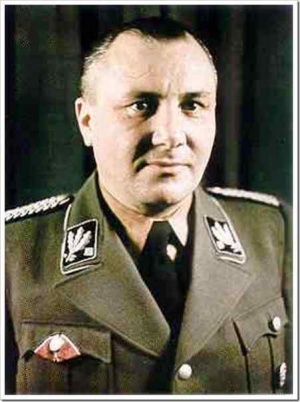Martin Bormann
 | ||||||||
| Born | 1900-06-17 Wegeleben, Prussia, Germany | |||||||
| Died | 1945-05-02 (Age 44) "1945-05-02" Berlin, Germany | |||||||
| Nationality | German | |||||||
| Children | • Adolf Martin Bormann • Ilse Bormann • Irmgard Bormann • Rudolf Gerhard Bormann • Heinrich Hugo Bormann • Eva Ute Bormann • Gerda Bormann • Fritz Hartmut Bormann • Volker Bormann | |||||||
| Spouse | Gerda Buch | |||||||
| Interest of | Tony Gosling, Paul Manning, Laurence de Mello | |||||||
| Party | National Socialist German Workers' Party | |||||||
A prominent official in Hitler's government with control over assets plundered by the Nazis. The official story says he died in Berlin in 1945, although this is disputed.
| ||||||||
Martin Bormann was a Nazi party official. He was in charge of the finances of the Nazi party. Opinions differ on whether he died in Berlin at the end of the war or whether he was escaped with the help of the UK deep state and fled to South America.
Contents
Official narrative
The official narrative has it that Martin Bormann died whilst trying to escape the encirclement of Berlin by the Red Army on 30 April 1945. It rests largely on the testimony of Arthur Axeman, leader of the Hitler Youth and one of his companions on the break out attempt. He later claimed that he found Bormann's body after they went in separate directions and he was forced to double-back by a Red Army patrol. Soviet Lt. General Konstantin Telegin recalls his men bringing him Bormann's diary. There were persistent reports of sightings from Munich to various South American locations over subsequent decades. In 1998 genetic tests on a skull by the German authorities apparently confirmed it was that of Martin Bormann.[1]
John Ainsworth Davis' suggestion that Bormann survived
In 1997 former wartime COPP commando John Ainsworth-Davis, under the pen-name Christopher Creighton, published Op JB, his account of a supposed allied raid into Berlin to snatch Bormann. [2] The alleged top secret MI6 operation was carried out, he says, with the knowledge and approval of only King George VI, Winston Churchill, Ian Fleming, Lord Louis Mountbatten and Desmond Morton. The book contains facsimiles of typed letters from Winston Churchill and Ian Fleming supporting Ainsworth-Davis' story. John says a 'double' of Bormann was taken with them on the raid who'd had dental surgery so that he would match the real Bormann. In an interview with Buenos Aires based British journalist Laurence De Mello Ainsworth-Davis says, "We took Bormann out, and the other chap was blown to pieces." [3]
Martin Bormann - Nazi in Exile
Paul Manning, a war reporter in WW2, researched the Bormann Organization in South America in detail and confirmed early on, that Martin Bormann is indeed still alive. He died before he could publish a second book on the topic. His surviving son was interviewed in 1998 by Dave Emory for Spitfirelist.[4]
Reinhard Gehlen
In his memoirs, Nazi and later BND chief Reinhard Gehlen claimed Borman was a Soviet spy, without elaborating any further, and that Borman had survived the war and was resettled in the Soviet Union.[5]
Nuremberg trial in absentia
That the official narrative that Martin Bormann died in Berlin at the end of the war took some time to become established can be gauged from the fact that in October 1946 the Nuremberg trials sentenced Bormann to death in absentia.[6]
Sightings
Since 1945, there were persistent sightings of Bormann.[6]
Related Document
| Title | Type | Publication date | Author(s) | Description |
|---|---|---|---|---|
| File:Martin Bormann - Nazi In Exile.pdf | book | 1981 | Paul Manning | A deep history of transnational corporate ownership networks originating from the fascist junction of state and economic power in Germany before and during WWII |
References
- ↑ https://www.independent.co.uk/news/dna-test-closes-book-on-mystery-of-martin-bormann-1161449.html
- ↑ http://www.amazon.co.uk/dp/0671855654
- ↑ http://www.youtube.com/watch?v=miJ4IH4MGC0?t=20m52s
- ↑ http://spitfirelist.com/for-the-record/ftr-125-interview-with-peter-manning/
- ↑ Reinhard Gehlen, "Der Dienst" (Wiesbaden 1971)
- ↑ a b http://www.dailymail.co.uk/news/article-1210412/British-obsession-Hitlers-deputy-Martin-Bormann-led-MI5-Nazi-goose-chase.html